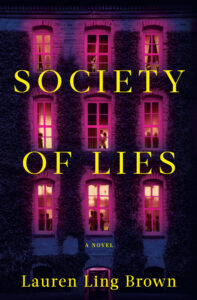Beyond the ivied brick, cloisters, and towers, they walk in twos and threes. The humanities students with their leather-bound books who debate Nietzsche by candlelight. Dressed in navy and forest green, they gather in their dorm rooms and societies, glass of wine in hand, as they bond with fellow students.
What is it about these characters’ lives that is so appealing that an entire genre of literature has been named after them?
Dark academia is a sub-genre of suspense and thriller that has gained a cult-following over the past decade with best-selling hits like Donna Tartt’s 1992 literary suspense, The Secret History, and Leigh Bardugo’s 2019 YA fantasy, Ninth House. Over the pandemic, when many readers were stuck indoors, the genre experienced a resurgence on sites like Pinterest, Instagram, and TikTok, featuring influencers who embraced the aesthetic (Andrew, CNN). Think moody interiors, plaid, taper candles, and black cats.
With its emphasis on both the old and the new—nostalgia and intrigue—it is no wonder the genre has taken hold across millennial and gen-z generations alike, and yet the origin remains somewhat difficult to pinpoint.
Many believe dark academia originated in the ‘90s, but over the following thirty years, the genre has expanded. Good Will Hunting (1997), Cruel Intentions (1999), Harry Potter (2001-2011), Gossip Girl (2007), The Social Network (2010), and Wednesday (2022), to name a few. These stories explore universal themes: Are ethics innate or learned? What is the price of friendship? Of wealth? Of desire?
Some criticize dark academia for its Eurocentric ideals, and despite publishing’s pledge to include more diverse voices, the genre still lacks representation. Another critique of the genre is the focus on the privileged few, characters who live enviable lives and are unconcerned by the state of the world, job prospects, or the cost of rent.
Despite its shortcomings, there remains a fascination with rich people behaving badly, a trend that has been around for a long time and shows no sign of leaving. Television shows like White Lotus, Succession, and Knives Out, books like Big Little Lies, Malibu Rising, and many more, are examples of the trope. And who doesn’t love to see the one percent struggle?
Perhaps readers also have a nostalgia for the past, before burnout and social media and AI. Pamela Paul’s opinion piece for The New York Times suggests that readers yearn for a time where a focus on learning was a priority. “The towering, all-powerful professors of yore are now often adjunct or contract instructors, with lower pay and tenuous job security,” so it makes sense that readers would want to imagine a world where they can spend their days in libraries and classrooms (Paul, The New York Times).
It’s hard to deny that the role of the university has shifted in the past decade. Enrollment has declined. What was once considered a safe haven for debate may no longer exist. With the rise of AI-generated information (or misinformation) in bite-sized memes, it’s no wonder we have drifted apart.
So what does all this change mean for the genre?
While writing my debut novel, Society of Lies—a suspense set at Princeton that follows a woman of color who learns that her sister’s death may be connected to a secret society—these ideas fascinated me. A shy, nerdy Black and Chinese kid from Northern California who spent more time in libraries than at parties, I was overjoyed when I received my acceptance letter. The following fall, stepping off of the train on to Princeton’s campus was both incredible and a culture shock.
When writing this novel, I wondered if I could write a dark academia from that outsider perspective that explored some of these questions.
What would it look like for a woman of color from a middle-class background to join an elite society? How far would she go to belong? What happens when that society is exploited by the wrong person?
My hope was not to answer them, but to let the reader decide what they believed was right. I hoped that readers might bring up these topics at their dinner tables or book clubs, discuss them with family and friends.
I would love to read more dark academia novels that challenge the status quo. Novels written by other people of color, queer, and non-conforming voices, who have both shared and unique experiences from my own. By reading widely, I hope that we can understand one another better and realize that many of us are more alike than different.
In this list below, I have gathered some of my favorite dark academia novels by BIPOC authors. I hope you enjoy them, too!
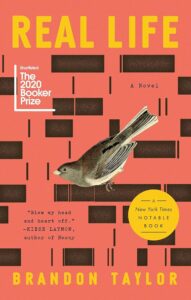
Real Life by Brandon Taylor
An introverted PhD candidate pursuing a biochem degree unexpectedly falls for his white supposedly-straight friend at their Midwestern university. His father has recently passed, and so too have his beloved nematodes. Exploring identity, loneliness, and love from a Black queer student’s perspective, Taylor weaves an intimate yet powerful work of literary fiction.
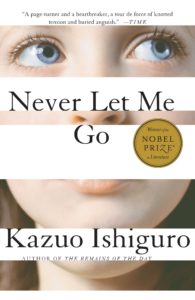
Never Let Me Go by Kazuo Ishiguro
In this haunting tale, Kathy recounts her days at Hailsham, an idyllic boarding school on the English countryside where the teachers both showered the students with praise and kept an eerie distance from them. Now a young woman, Kathy has reconnected with former classmates, Ruth and Tommy, and is finally beginning to realize how they ended up in Hailsham and what that means for their future.
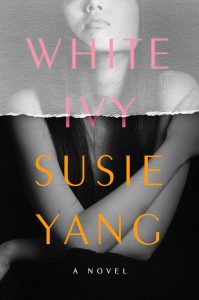
White Ivy by Susie Yang
Though this novel doesn’t take place solely on a school campus, its themes of ambition, privilege, and identity fit well within the genre. White Ivy is a coming-of-age suspense about a Chinese-American young woman whose goal is to rise up from her middle-class background and pursue success and wealth by all means necessary.
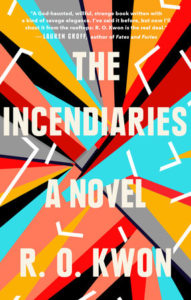
The Incendiaries by R.O. Kwon
In this literary work, a young woman gets drawn into a religious cult and the violence it unleashes on innocent people. It is about how terrible people can hide behind religion, preying on the vulnerable. Kwon’s voice is poetic and captivating as she explores love, faith, and the loss of both.
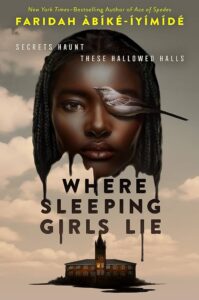
Where Sleeping Girls Lie by Faridah Àbíké-Íyímídé
The author of NYT bestseller Ace of Spades is back with a new novel set at a boarding school. Sade Hussein is staring her third year at an elite boarding school, but when her roommate disappears and the investigation turns on her, Sade must solve the mystery on her own and uncover the school’s darkest secrets.
And here is my book, below!
Society of Lies by Lauren Ling Brown
Maya is forced to confront her past when she learns that her sister’s death may be connected to a secret society at Princeton. This is my debut novel, and in writing it, I drew inspiration from my experience at the university and my relationship with my sister, whom I love very much. I hope you enjoy!
Works Cited
Alter, Alexandra and Elizabeth A. Harris. “Published Pledged to Diversify. Change Has Been Slow.” The New York Times, Feb. 28, 2024. Accessed: May 24, 2024. https://www.nytimes.com/2024/02/28/books/publishing-books-poc-dei.html.
Andrew, Scottie. “A guide to ‘dark academia,’ the TikTok-popular aesthetic with preppy style and an intellectual focus.” CNN, Jan. 29, 2022. Accessed: May 25, 2024. https://www.cnn.com/style/article/dark-academia-tiktok-aesthetic-cec/index.html.
Bruce, Amanda and Ariane Cruz. “ Dead Poets Society & 19 Other Movies For Fans Of The Dark Academia Aesthetic.” Screen Rant, Sept 27, 2023. Accessed: May 27, 2024. https://screenrant.com/dead-poets-society-best-movies-dark-academia/.
Buchholz, Katharina. “How America’s Middle Class is Shrinking.” Forbes, Apr. 21, 2023. Accessed: May 23, 2024. https://www.forbes.com/sites/katharinabuchholz/2023/04/21/how-americas-middle-class-is-shrinking-infographic/?sh=5c972af084e0.
Dickler, Jessica. “College enrollment continues to slide as more students question the value of a four-year degree.” CNBC, May 29, 2023. Accessed: May 24, 2024. https://www.cnbc.com/2023/05/24/college-enrollment-continues-to-slide-as-a-four-year-degree-loses-appeal.html.
Gersen, Jeannie Suk. “The Future of Academic Freedom.” The New Yorker, Jan. 27, 2024. Accessed: May 23, 2024. https://www.newyorker.com/news/the-weekend-essay/the-future-of-academic-freedom.
Paul, Pamela. “Opinion: The Season of Dark Academia.” The New York Times, Oct. 30, 2022. Accessed: May 23, 2024. https://www.nytimes.com/2022/10/30/opinion/dark-academia-halloween.html.
Quiring, Ana. “What’s Dark About Dark Academia.” Avidly, Mar. 31, 2021. Accessed: May 24, 2024. https://avidly.lareviewofbooks.org/2021/03/31/whats-dark-about-dark-academia/.


